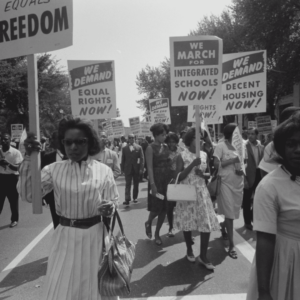 Black History Month provides a time for celebrating and learning about the triumph and struggles of the Black women and men who came before us–those who have made a difference, and those who continue to lead and inspire. With the entire month focused on the contributions of Black Americans, February provides the perfect opportunity to celebrate the Black women who have done – and continue to do – extraordinary things and highlight the inequities in the system we all must work to overcome.
Black History Month provides a time for celebrating and learning about the triumph and struggles of the Black women and men who came before us–those who have made a difference, and those who continue to lead and inspire. With the entire month focused on the contributions of Black Americans, February provides the perfect opportunity to celebrate the Black women who have done – and continue to do – extraordinary things and highlight the inequities in the system we all must work to overcome.
Black women have historically not been valued for their work, but it’s their work that has shaped our country. If rampant systemic racism isn’t enough to contend with, the Center for American Progress reports that, “Black Women’s labor participation rate is higher than the rate for all other women, yet Black women remain less likely than their white counterparts to occupy higher-level jobs that offer better benefits, greater mobility, and economic stability. Collectively, the economic disparities facing Black women reveal a stark reality – too often, Black women’s work is devalued and does not reap the same rewards afforded other workers.”
Despite the odds stacked against them, Black women continue to lead and break barriers that benefit us all. Here are just some of the amazing women we need to celebrate this month and every month, and empower other women to follow their lead.
Vice President Kamala Harris – the first female vice president and the first woman of Black and South Asian descent to be vice president. She is a former San Francisco district attorney and was elected as the first Black woman to serve as California’s attorney general. When she was elected a United States senator in 2016, she became only the second Black woman in the chamber’s history.
Tarana Burke – is a civil rights activist who founded the #MeToo campaign in 2006 when she used the phrase to illustrate the pervasive nature of sexual violence. Eleven years later, it found global recognition after tweet by actress Alyssa Milano. She has been recognized as one of the “Silence Breakers” and was named as Time’s Person of the Year in 2017. She continues to fight for survivors and point out the rampant sexual violence that permeates all of society’s systems and structures.
Shirley Chisholm – the first Black woman to be elected to Congress in 1968. She was also the major-party Black candidate to run for president in 1972. Throughout her career in politics and education, she fought for child welfare, black women’s reproductive rights, and more.
Coretta Scott King – one of the most important and influential civil rights activists of our time, she fought tirelessly for African-American equality. She did not slow down after her husband, Martin Luther King, Jr. was assassinated, but instead continued to speak out on behalf of racial and economic justice, women’s and children’s rights, gay and lesbian dignity, religious freedom, the needs of the poor and homeless, full-employment, healthcare, educational opportunities, nuclear disarmament and environmental justice.
Flo Kennedy – was an American lawyer, feminist, civil rights advocate, lecturer and activist. A founding member of the National Organization of Women and one of the first black female lawyers to graduate from Columbia Law School, she helped found the Feminist Party in 1971, which later nominated Representative Shirley Chisholm for president.
Mary McLeod Bethune – a leading educator and civil rights activist, she believed education was the key to racial advancement. A champion of racial and gender equality, she founded many organizations and led voter registration drives after women gained the vote in 1920. In 1924, she was elected president of the National Association of Colored Women’s Clubs, and in 1935, she became the founding president of the National Council of Negro Women. She also founded the college that is now known as Bethune-Cookman University in Florida.
The accomplishments of these women and so many more that have often been omitted from the history books should serve to inspire and ignite all of us to march forward toward equality lifting as we go. As Dr. Nancy says, “We will not move forward until we all move forward together.” That means we need to learn the stories of Black women, and all women of color; we need to celebrate their contributions, so that together we can create a world that is just, and benefits us all equally.

